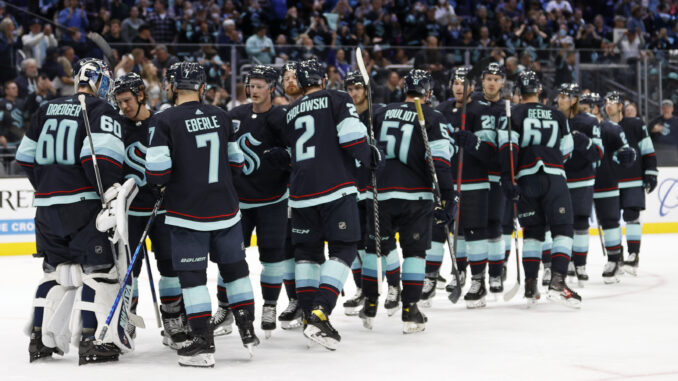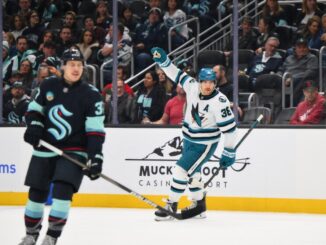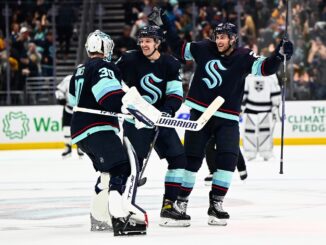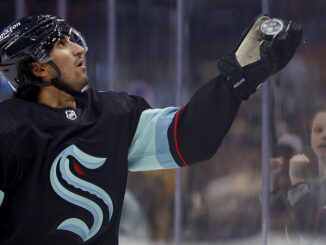
The NHL is in the thick of the second round of the 2022 Playoffs, but the Seattle Kraken are nowhere to be found after finishing well outside the Western Conference playoff picture this season. The expansion franchise was plagued by a number of issues in its inaugural season, with underwhelming free-agent signings, an anemic offense, and ineffective special teams among the main culprits. Heading into his second offseason, general manager Ron Francis must address those main areas of concern.
The honeymoon period is over, and fans should expect either immediate playoff appearances or a concerted effort to build towards a Stanley Cup through a targeted rebuild. Let’s dig into how I think Francis and the Kraken should approach the offseason in the hopes of taking the next step in their competitive timeline.
Continue to Collect Draft Picks
As the Kraken began to fall out of the playoff race, their attention turned to how the team could build up its shallow prospect pool. With prized prospect Matty Beniers set to become a full-time contributor next season, their collection becomes even more barren. The Kraken traded several pending Unrestricted Free Agents (UFAs) and are set to enter the 2022 Draft with at least 12 picks, including four second-round selections. Rationally re-evaluation of their team’s place in the NHL’s hierarchy is a crucial endeavor at which many organizations fail, so it’s encouraging to see Kraken management understand that they are far from challenging for a Stanley Cup. The Kraken also own three second-round picks in a loaded 2023 draft class, and the two upcoming drafts could be foundational events in the team’s championship journey.
Related: Seattle Kraken 2021-2022 NHL Season Review – What Worked, What Didn’t
Looking at the team’s salary commitments, there are several older players that are more valuable to teams closer to Stanley Cup contention than the Kraken. Forwards Jordan Eberle and Joonas Donskoi are on the wrong side of 30, and defenders such as Carson Soucy and Adam Larsson are strong defensive players capable of contributing to a contender. No-Trade clauses and high cap commitments (all make at least $3.9 million for multiple seasons) might make them difficult to trade, but not impossible.
Still, Francis’ recent comments indicating that the Kraken hope to make another splash in free agency gives me pause. Even if the goaltending drastically improves, the team is no better than a fringe playoff group. It’s not worth hamstringing the organization with even more rapidly depreciating value contracts just to secure a few home playoff dates. It’s a shortsighted mindset that too many executives have fallen prey to, and the Kraken would do well to resist the temptation.
Acquire Young Forward Talent
While one or more of their seven second-round picks in 2022 and 2023 could be used as intended, they could also be packaged to acquire forward prospects further along in their development. Jared McCann (25) and Beniers (19) are the only forwards under the age of 25 who can be considered integral pieces upfront, which doesn’t bode well for their future outlook (for now). Even with proven veteran attackers in tow, the Kraken trotted out one of the least intimidating offenses this season. They only scored 2.6 goals per game (28th in the NHL) and fired an average of 29 shots a night (29th), not to mention that McCann’s 50 points were the lowest among team-leading scorers this season.
One untapped market is the annual crop of Restricted Free Agents (RFAs), players who need to be tendered an offer sheet with their team’s receiving compensation if offers are signed and unmatched. Even with the reported salary cap increase of $1 million next season, several teams could be ripe for targeting due to financial constraints.
Related: Beniers’ NHL Debut Gives Seattle Kraken Hope For Bright Future
One such pairing is the Minnesota Wild and Kevin Fiala, with the team and forward owning a contentious history in recent seasons. Minnesota’s twin buyouts of Zach Parise and Ryan Suter will cost them $12 million in cap space in 2022-2, while the team will only have around $8 million to sign two forwards and a backup goaltender. Fiala made $5.1 million this season and enjoyed a career year with 85 points in 82 games. At only 25 years of age, it’s safe to say he would be worth a cap hit of over $5 million for at least a few more seasons, and it’s a raise the Wild may not be able to provide. It could cost the Kraken several draft picks in compensation, but I’d argue it’s a better investment than continuing to sign declining 30-year-olds in free agency.
Other offer sheet candidates include Nicolas Roy (Vegas Golden Knights), Jack Roslovic (Columbus Blue Jackets), and Jesse Puljujarvi (Edmonton Oilers), each with uncertain futures in their current markets. Either of these options be given an expanded role with the Kraken and are more appropriate for the Kraken’s timeline. As such, Francis’ activity in free agency will show just how the organization views their chances next season.
Address Their Issues on Special Teams
Show me a non-playoff team, and I’ll show you at least one dysfunctional special teams unit. The Kraken are no exception, with their efficiency on the power play (29th) and the penalty kill (31st) among the worst in the NHL. According to Natural Stat Trick, the Kraken ranked 26th in expected goals per-60 (a proxy for chance quality) with the man-advantage, and 19th in expected goals against per-60 on the penalty kill.
Related: Seattle Kraken’s Dunn Showing Great Potential
Their lack of offensive talent on the roster is a big factor in their impotent power play. It’s difficult to finish off chances when the team’s first-liners are players who would be second- or third-liners on any other team. Their strategy in free agency should be to add low-risk, high-reward bets who could inject such sorely-needed skill at a bargain-bin price.
Seattle’s awful goaltending (last in team save percentage) was a significant factor in their poor penalty-kill efficiency, but they struggled to suppress chances nonetheless. Admittedly, their shorthanded efforts are less of a concern, as competent goaltending could quickly make the penalty kill look respectable. The team’s massive investment at the position (Philipp Grubauer and Chris Driedger make a combined $9.4 million until 2024-25) means they’re stuck hoping the pair can experience a resurgence next season. Is that enough to improve the team’s special teams results?
Francis’ Offseason Moves Will Dictate Kraken’s Future Trajectory
Without trying to come off as hyperbolic, this upcoming offseason could prove to be a crucial turning point in the Kraken’s trajectory as a franchise. The 2023 Draft, in particular, promises to be chock-full of generational talent, and Francis’ stated goal to build through free agency seems ignorant of the opportunity at hand. Being as poor as possible to increase the chance of drafting a Connor Bedard or a Matvei Michkov while accruing more draft picks would set up the Kraken for Stanley Cup contention in the back half of this decade.
Perhaps Francis feels like he’s on the hot seat and is adopting a more short-term view in his management. If that’s the case, the Kraken could miss the opportunity to build something special. For the franchise’s sake, I hope they reconsider – the fans deserve a winner.
Data courtesy of CapFriendly, Natural Stat Trick, MoneyPuck, and the NHL.




